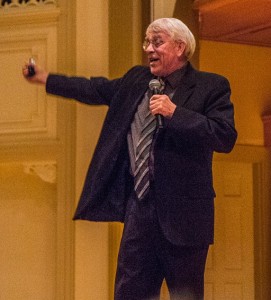A visiting professor and “terrorism expert” said that religion has been, and continues to be, a major part of how people view the world, even as it becomes more globalized.
“Who among us doesn’t lead an ordinary, boring, messy life?” Mark Juergensmeyer, Ph.D., asked the audience during his PLACE lecture. “For many people religion provides a spiritual battle based on the contemporary social structures of our time.”
Religion, Juergensmeyer said, answers three of the fundamental questions all people ask: who are we? Who is in charge? How can we be safe?
During an interview with Mahmud Abouhalima, the man convicted of the 1993 World Trade Center Bombing, Juergensmeyer discovered how deeply engrained the tenets of religious warfare can be. Juergensmeyer asked Abouhalima, after he had described how Americans were like sheep, shielded by the government and ignorant to the war around them, whether this was the reason people bombed buildings.
“Now you know,” was Abouhalima’s reply.

Years later, Juergensmeyer would recall this conversation when the two towers of the World Trade Center fell after a terrorist attack.
“On 9/11 I remember thinking, ‘I hope people don’t overreact,’” Juergensmeyer said with a sad smile. This event led to the invasion of Afghanistan and the beginning of the “War on Terror,” which he believes is linked to the politics of religion.
Juergensmeyer does not, however, think that religion is inherently bad. Although at times it inspires violence and evil, it does also gives us a “global moral critique.”
He spoke to the Grand Mufti, leader of the Muslim clergy in Cairo, after the events of the Arab Spring in 2010 brought about a new kind of non-violent revolution through modern technology. Even in this era of globalization, the religious leader spoke of the necessity of religion because “In this world, we are lost without it.”
Juergensmeyer has become a leading expert in religion, terrorism and conflict resolution during his long career as a professor, author and social activist. However, he is not entirely comfortable with the title of “terrorism expert.”
“I certainly didn’t start out that way,” Juergensmeyer said. “Whenever I hear myself described like this I think ‘Who is this guy?’”
Remaining humble throughout his lecture, Juergensmeyer described his childhood summers in Illinois when the only entertainment came from attending gospel revivals. The sermons gave him a feeling of purpose and passion through his religious beliefs. It was a feeling he remembered years later when he met with Sikh leader Jarnail Singh Bhindranwale in Punjab, India during 1984. Bhindranwale was a revolutionary leader, reviving the fundamentalist beliefs of his religion in response to an increasingly secular world.
“This was no ordinary politician,” Juergensmeyer said of Bhindranwale. “He spoke of rising up as soldiers, a time for battle and not giving in to the easy way of life.”
The idea of a world at war is key, Juergensmeyer said, to understanding how religion can be used in our contemporary world. He spoke of how every major world religion, from Christianity to Buddhism, has roots of using violence to protect righteousness. While the basis for many religions is peace, there is also a call to action and necessity to fight for your beliefs against corruption of values.
Olivia Marovich / News editor
Olivia Marovich can be reached at [email protected]






